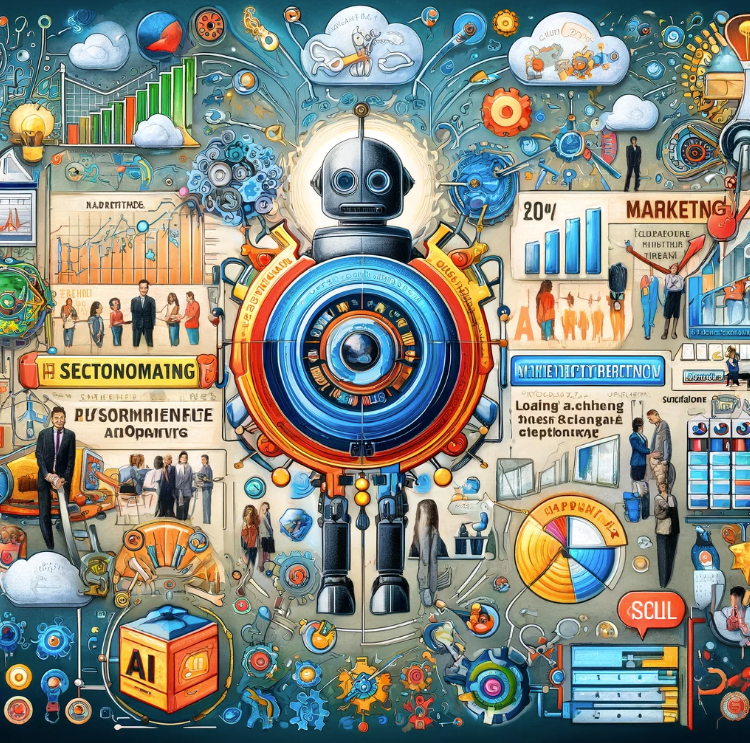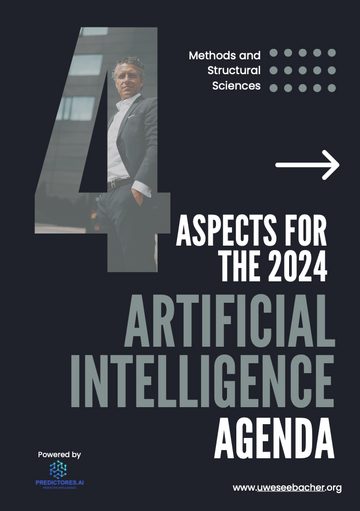The Transformation of Marketing and Sales: A Paradigm Shift Driven by Artificial Intelligence and Predictive Intelligence
by Uwe Seebacher on Apr 07, 2024

This articles explores the transformative impact of Artificial Intelligence (AI) and Predictive Intelligence (PI) on marketing and sales practices. Drawing on the author's extensive experience in the field, the paper delves into the practical applications of AI, its evolution beyond automation to strategic decision-making, and the emergence of PI as a methodology for data-driven business forecasts. The paper further analyzes the ethical considerations and challenges associated with AI integration alongside success stories from industry leaders. Finally, it proposes a vision for the future of AI in marketing and sales, emphasizing predictive analytics, intelligent automation, and the critical role of human oversight and ethical governance.
Introduction
The landscape of marketing and sales is undergoing a significant transformation driven by the emergence of Artificial Intelligence (AI). This paper argues that AI represents more than just a technological leap; it signifies a fundamental shift in how businesses interact with data and make strategic decisions. This transformation is fueled not only by AI technologies but also by advancements in Predictive Intelligence (PI), a methodology conceived by the author to leverage historical data for data-driven business forecasts.
From Automation to Strategic Decision-Making: The Expanding Role of AI in Marketing and Sales
The initial impact of AI in marketing and sales was primarily focused on automating repetitive tasks, such as content creation and campaign management. This freed up human resources for more strategic activities like planning and execution. However, the potential of AI extends far beyond automation. AI-powered personalization allows for highly targeted campaigns tailored to individual customer profiles, leading to increased engagement and conversion rates.
In sales, AI streamlines operations by automating scheduling, reporting, and lead qualification. This empowers sales teams to focus on building relationships, nurturing leads, and closing complex deals. AI tools such as lead scoring and demand forecasting provide businesses with the ability to predict and proactively meet market demands, ensuring a competitive edge.
Companies like Amazon and Netflix stand as testaments to the success of AI in marketing and sales. By leveraging AI for recommendation engines and customer experience optimization, these companies have fostered exceptional customer loyalty and operational efficiency.

Challenges and Considerations in AI Integration
Despite its undeniable benefits, the integration of AI into business processes is not without its challenges. Ethical considerations regarding data privacy, bias in algorithms, and the potential for manipulation require careful attention. Transparency is paramount in building trust with customers and ensuring equitable treatment. Furthermore, the substantial financial and intellectual investment in AI technologies necessitates a cost-benefit analysis and a balanced approach to adoption.
The Future of AI in Marketing and Sales: A Vision for Predictive Analytics and Human-AI Collaboration
The future of AI in marketing and sales is poised for further advancements in predictive analytics and intelligent automation. These developments will refine customer insights, enabling businesses to anticipate customer needs and preferences with greater accuracy. Moreover, intelligent automation will free up human resources to focus on higher-level cognitive tasks such as creative marketing initiatives and complex negotiations.
The success of AI integration hinges on the interplay between AI capabilities and human expertise. Human creativity will remain essential for strategic planning, ethical governance, and ensuring AI systems operate with fairness and transparency. This synergy will define the next frontier in business evolution, where AI augments human capabilities to drive customer-centric strategies and unlock unprecedented levels of engagement.

Conclusion
The journey of integrating AI and PI into marketing and sales is a continuous narrative of innovation, challenge, and opportunity. As businesses embrace this transformation, the combined power of human ingenuity and AI's advanced capabilities will pave the way for the development of revolutionary business strategies and redefine customer engagement in the years to come. Further reading on the valid allocation of AI as being not more than a further advanced calculator can be found in my other article titled "AI Reimagined:
A Pioneering Formula for the Modern Era".
Keywords: Artificial Intelligence, Predictive Intelligence, Marketing Automation, Sales Optimization, Customer Engagement, Business Strategy




